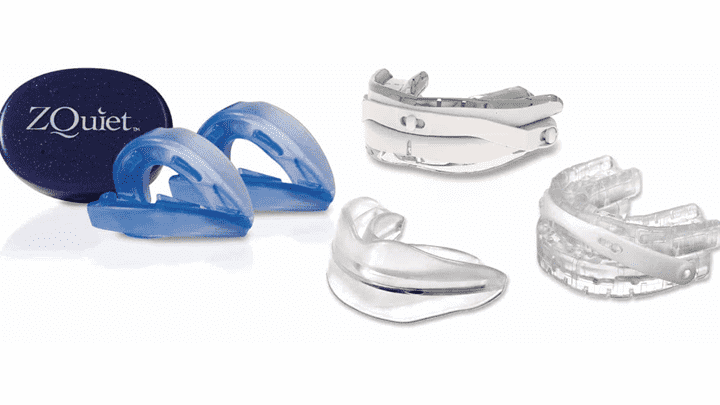Myths about Snoring Mouthpieces
Snoring does not discriminate. Anyone of any age, gender, or state of health can suffer from snoring. Some cases are mild to moderate, while others can be severe and result in a variety of health concerns including sleep apnea.
One solution for preventing the harm caused by snoring could be by utilizing a snoring mouthpiece or other anti snoring devices. Many potential patients, however, may harbor some reservations about their effects on a patient’s teeth. Here, we bust three myths about snoring mouthpieces and teeth.
MYTH 1: Snoring mouthpieces will stain your teeth
Trying to stop snoring in the middle of sleep is much more about health than it is about aesthetics. But humans are a vain species!
Thus it should come as no surprise that many people are worried what placing a mouthpiece into their mouth every night might do to the physical appearance of their teeth. However, if you take proper care of both your teeth and the mouthpiece each night, you should have nothing to worry about for your pearly whites!
“They do not cause tooth staining,” says family, cosmetic and implant dentist Dr. Marielaina Perrone on Snore.net. “However, you should always thoroughly clean the appliance after use and let it air dry.
Your teeth should be brushed and flossed before placing the device into your mouth for the night. Also, have your appliance checked and cleaned at your regular dental hygiene appointments.”
Experts note, however, that you should always be careful — especially if you already have other implants in your teeth. Amalgams or silver fillings can create stains on the mouthpiece, but that can often depend on the liner the patient uses. Nor will this interfere with the longevity of the mouthpiece.!
MYTH 2: Snoring mouthpieces will cause your teeth to shift or move in a damaging way
A device that is not specifically built to move or shift your teeth is not going to shift the position of your teeth over time — in general, at least. As in life, nothing is certain, and moving teeth is always a risk, and tons of patients will often find the layout of their mouth has changed a bit after removal each day.
The patient’s bite layout may alter briefly, a change which will generally revert to normal once the patient stops utilizing the mouthpiece. (Think of it as the brief shift in tooth alignment that takes place if a former wearer of braces tries to put on his or her nightly retainers after several days or weeks of not doing so.)
Most people whose bites change shape choose not to seek restorative treatment or help, as the shift in alignment will rarely interfere with their ability to speak, chew and swallow. Ultimately, the choice is up to each individual whether the consequences of the health risks associated with snoring are worth the possible minor, usually temporary, shift in bite or tooth layout.
The best way to counteract this possible effect, according to experts, is to make sure the mouthpiece is custom fitted for the patient’s unique mouth. This will also make for a more comfortable sleep cycle at night, and reduce aches and pains upon removal in the morning.
Says Dr. Perrone, “[Patients] should not interfere with tooth alignment if made properly. It usually takes about 30 minutes for the feeling to go away that your bite is slightly off. This is the time it takes for your jaw muscles to relax and readjust.
MYTH 3: You should rely on sleeping pills for a good night’s sleep
Just like braces, a mouthpiece might not be for everyone — and it is important to keep in mind you should not freak out just because you are snoring occasionally (everyone does sometimes, after all!).
However, simply achieving a good night’s sleep by taking a few sleeping pills or drinking chamomile tea will only help you in the short term. It masks the problem but does nothing to fix it, so you’re left with all f the long-term consequences.
Today’s Anti-Snoring Mouthpiece is Also a Huge Moneysaver!
Many people who would benefit the most from a snoring mouthpiece choose not to get one because they are afraid of the costs of going to a dentist or shelling out for a custom fitting. For those who might hope to save some money, there are finally tremendous alternatives.
You can find “boil and bite” mouthpieces online or at your local pharmacy or drugstore. These mouth guards work by placing them briefly in boiling water to soften up the plastic material.
Then, the patient takes them out and allows it to cool slightly, but not enough for the material to harden up again — and then bites into it to create their own custom cast. These options are often much more affordable.
A great mouthpiece can last a year or more – for $100 or less, too! Check out our best mouthpieces list to study the exciting options available now.


